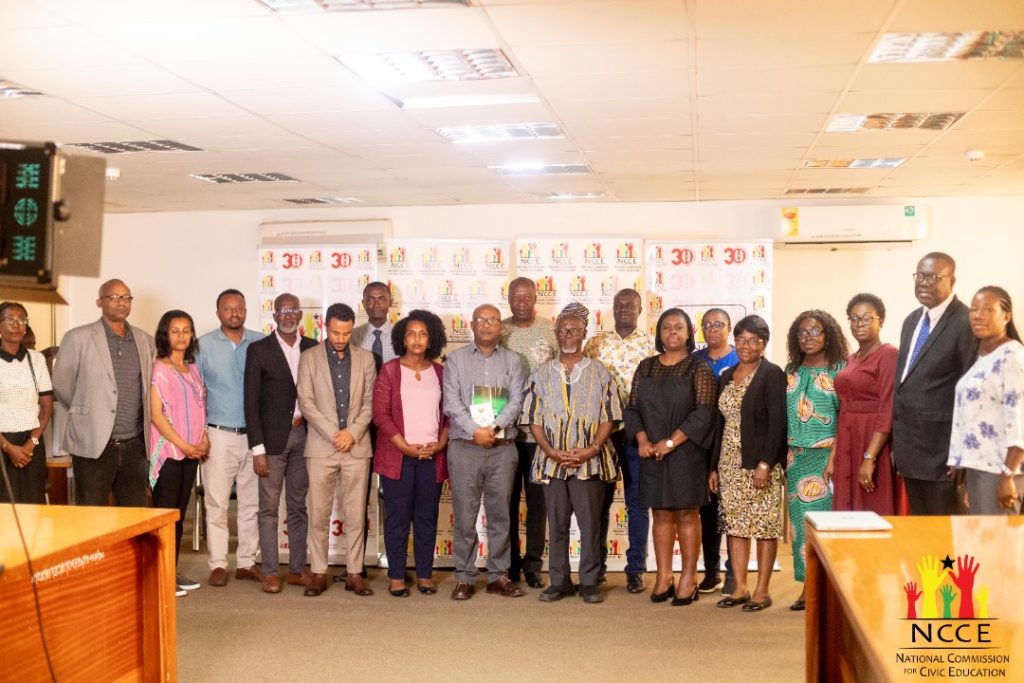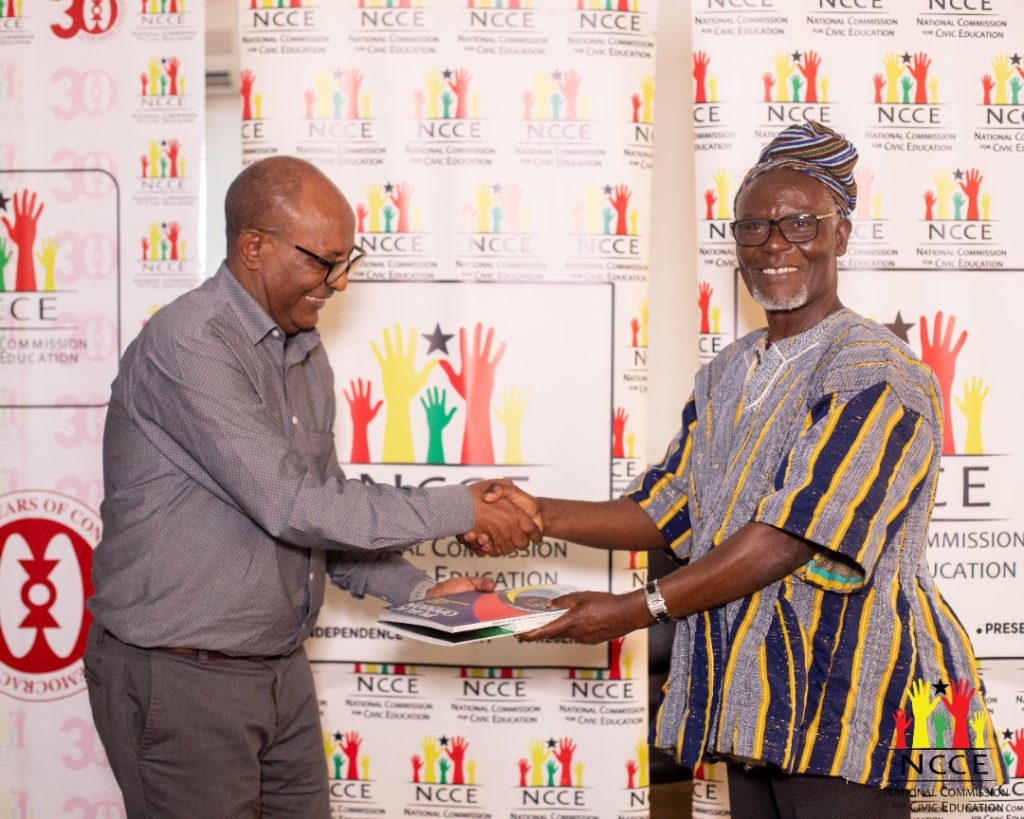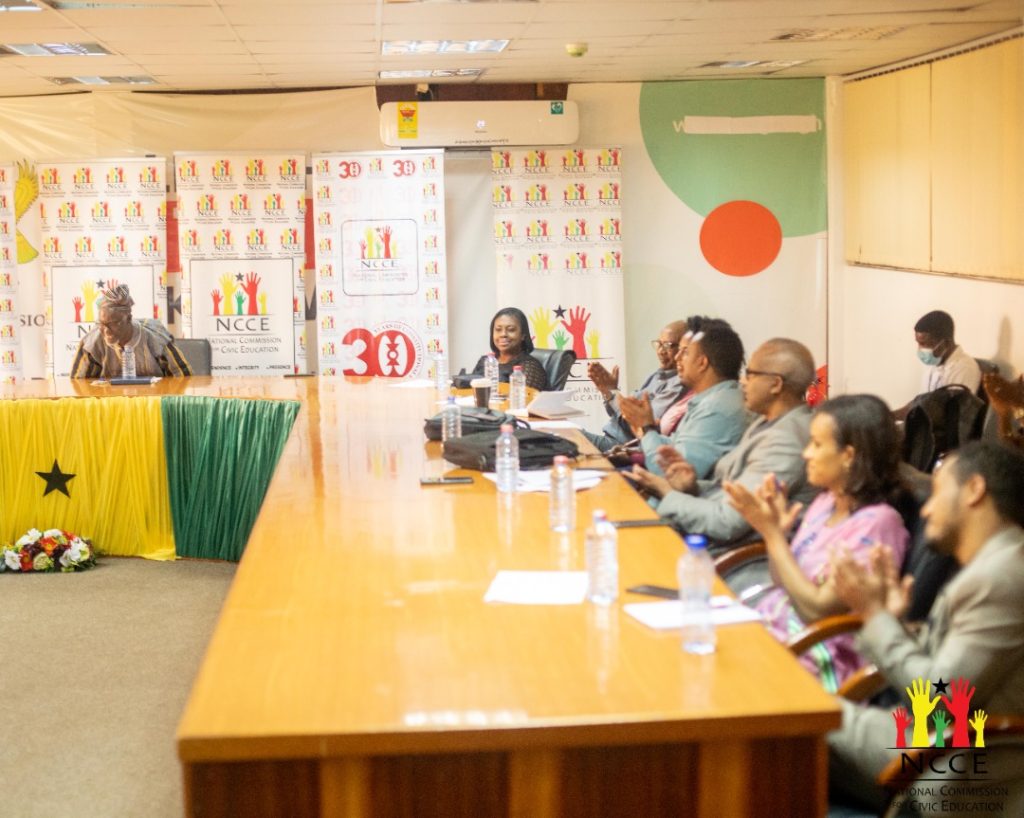By Benjamin A. Commey
Accra, Sept. 9, GNA — Mr Samuel Asare Akuamoah, the Deputy Chairman in-charge of Operations at the National Commission for Civic Education (NCCE), has charged relevant stakeholders to intensify community engagement on violent extremism in the country.
He said this would ensure community members were well informed about the reality of the threat and help avoid being caught off guard.
He said this in an interview with the Ghana News Agency when the Commission received a six-member delegation from the Ethiopian Human Rights Commission (EHRC) in Accra, on Thursday.
The delegation was led by Mr Mebratu Gebeyenu, the Director, EHRC, and had Dr Mekdes Tadele, EHRC and Temkin Mekonnen, EHRC Coordinator, as members.
The rest were; Belite Relt, HRE Coordinator, EHRC, Serait Sisay, an officer and Biruk Jemal, Human Rights Officer.

Also at the meeting was Nana Yaa Amua-Sekyi, the Director in charge of Public Education, Commission on Human Rights and Administrative Justice (CHRAJ).
The meeting formed part of a week-long working visit by the delegation to the country to study Ghana’s progress and achievements in civic education and human rights protection.
Ghana, over the last few months have been on high alert over possible attack from violent extremists operating in the sub-region.
Countries such as Burkina Faso, Mali and La Cote d’Ivoire have all been hit in the last couple of years.
Mr Akuamoah explained that the current insecurity within the sub-region required Ghana to strengthen community engagement to ward off any possible extremist infiltration.

He warned Ghanaians against complacency as that could spur doom for the country’s enviable democratic stability.
He noted that despite the peace Ghanaians had enjoyed over the years, in a highly unsecured and volatile region, it could not afford to relax on its laurels and be on guard.
“In the sub-region, we (Ghana) have been blessed, but we don’t have to be complacent. We have been very peaceful, we have lived harmoniously together but we should not be complacent,” he emphasised.
Mr Akuamoah added that: “Burkina Faso has been hit by violent extremist groups, La Cote d’Ivoire has been hit, Togo has been hit, we have groups, violent groups, criminal groups operating on our sea waters close to West Africa here in the Gulf of Guinea, attacking fishing vessels and others, something which is unprecedented, happening this time.
“And it looks like we have been circled and this calls for a better community engagement effort by the NCCE, key stakeholders, the Ministry of National Security who already we are working with, to really keep our security together.”
Mr Akuamoah, who is also a member of the Governing Council of the National African Peer Review Mechanism (AFRM), expressed concern over the high rate of youth migration on the continent.
He explained that such acts provided an avenue for youth to be recruited by violent extremist groups and posed huge risk to the security of the continent.
To mitigate this, he urged African governments to double their efforts of job creation to engage the youth as well build strong economies to discourage youth exodus.
He assured the Ethiopian delegation of NCCE’s readiness to support to build a resilient civic education system.

Mr Kojo Tito Voegborlo, Commission Secretary, NCCE, attributed the many conflicts on the continent to electoral disputes and the lack of strong civic education systems in many African countries.
He noted that Ghana’s democracy had relatively been sustained for nearly three decades due to the strong importance it placed civic education.
Mr Voegborlo, therefore, charged African countries to place emphasis on civic education to keep citizens informed about their civic duties.
He also urged the Ethiopian delegation to ensure independence of any civic education organisation established to enable It to deliver on its mandate.
Mr Mebratu Gebeyenu, the leader of the Delegation, described CHRAJ as one of the strongest national human rights institutions in Africa.
He said as a country currently undertaking reforms in its human rights laws, understudying Ghana’s laws and civic education systems would help establish stronger systems.
“The information that we’ve got, the exposure that we’ve got will help us refine and polish our strategies to enhance our effectiveness in everything that we do,” he said.
In attendance at the meeting were heads of the various departments of the Commission, as well as other members of staff.
GNA